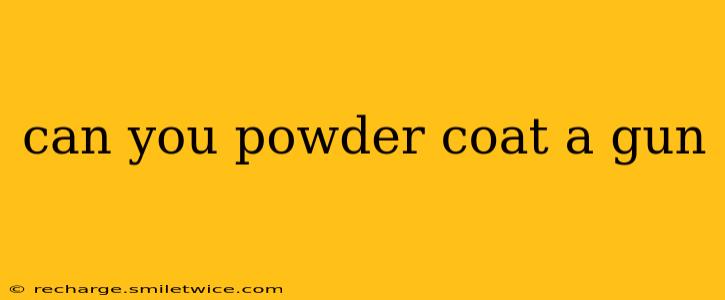Can You Powder Coat a Gun? The Complete Guide to Firearm Finishing
The question of whether you can powder coat a gun is complex, and the answer isn't a simple yes or no. While technically possible, it's crucial to understand the legal, safety, and practical considerations involved before attempting this process. This comprehensive guide will explore the intricacies of powder coating firearms, addressing common concerns and providing valuable insights.
Is it Legal to Powder Coat a Firearm?
The legality of powder coating a firearm depends heavily on your location and the specific regulations in place. Some jurisdictions have strict laws regarding modifying firearms, especially those considered "ghost guns" (homemade or untraceable weapons). It's absolutely essential to research your local, state, and federal laws before even considering powder coating any firearm. Modifying a firearm in a way that alters its serial number or renders it untraceable is illegal in most places and can lead to severe penalties.
Safety Precautions: A Crucial Consideration
Powder coating involves working with high temperatures and potentially hazardous materials. Improper handling can lead to serious injury or even death. Always prioritize safety:
- Ventilation: Powder coating generates fumes. Work in a well-ventilated area or use a respirator to avoid inhaling these potentially harmful particles.
- Eye Protection: Always wear safety glasses or a face shield to protect your eyes from flying debris and powder.
- Gloves: Protect your hands with appropriate gloves to avoid skin irritation from chemicals.
- Fire Safety: Powder coating involves high temperatures. Keep a fire extinguisher readily available and ensure proper safety measures are in place.
- Proper Equipment: Use only equipment designed for powder coating. Improper equipment can lead to malfunctions and accidents.
What are the Benefits of Powder Coating a Gun?
Powder coating offers several advantages over other firearm finishing methods:
- Durability: Powder coating provides a significantly more durable finish than traditional painting, offering excellent resistance to scratches, abrasion, and corrosion.
- Variety of Colors and Textures: Powder coating offers a wide array of colors and textures, allowing for customization and personalization.
- Cost-Effectiveness: In some cases, powder coating can be more cost-effective than other finishing methods, especially for DIY enthusiasts.
What are the Drawbacks of Powder Coating a Gun?
Despite its benefits, powder coating firearms has some limitations:
- High Temperatures: The high temperatures involved can damage certain firearm components, especially plastic or wood parts.
- Potential for Damage: Improperly applied powder coating can lead to uneven finishes or even damage to the firearm's functionality.
- Legal Ramifications: As previously mentioned, legal restrictions in your area might prohibit or limit the modification of firearms.
Can I Powder Coat My Own Gun at Home?
While it's possible to powder coat a firearm at home, it's generally not recommended unless you have extensive experience with powder coating and a thorough understanding of firearm safety. The risks associated with improper handling of materials and equipment outweigh the benefits for most individuals.
What Happens if I Powder Coat a Gun Incorrectly?
Incorrectly applied powder coating can lead to several issues, including:
- Uneven Finish: The coating might appear uneven, lumpy, or blotchy.
- Poor Durability: The finish might be less durable and more susceptible to damage.
- Functional Issues: The coating could interfere with the firearm's moving parts, leading to malfunctions.
- Safety Hazards: Improperly cured powder coating can release harmful fumes.
Are There Alternatives to Powder Coating a Gun?
Yes, several alternatives exist, including Cerakote, DuraCoat, and traditional painting. These methods offer different levels of durability, cost, and customization options. Research these alternatives to determine the best fit for your needs and preferences.
Disclaimer: This information is for educational purposes only and should not be considered legal or professional advice. Always consult with a qualified professional and comply with all applicable laws and regulations before attempting any firearm modifications. Incorrectly modifying a firearm can be dangerous and illegal.
